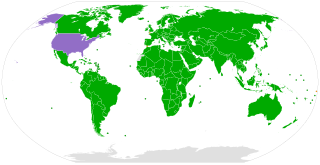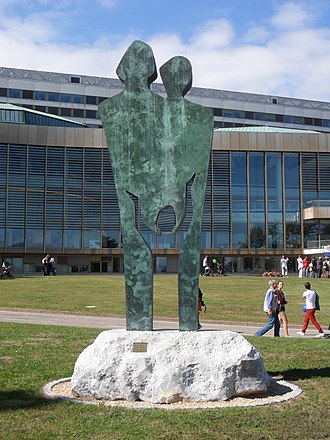
The United Nations Convention on the Rights of the Child is a human rights treaty which sets out the civil, political, economic, social, health and cultural rights of children. The Convention ("CRC") defines a child as any human being under the age of eighteen, unless the age of majority is attained earlier under national legislation.
The Save the Children Fund, commonly known as Save the Children was established in the United Kingdom in 1919 to improve the lives of children through better education, health care, and economic opportunities, as well as providing emergency aid in natural disasters, war, and other conflicts. After passing a century, it is now a global movement made up of 29 national member organisations which works in 120 different countries.

Children's Day is a commemorative date celebrated annually in honor of children, whose date of observance varies by country. In 1925, International Children's Day was first proclaimed in Geneva during the World Conference on Child Welfare. Since 1950, it is celebrated on 1 June in most Communist and post-Communist countries. World Children's Day is celebrated on 20 November to commemorate the Declaration of the Rights of the Child by the UN General Assembly on 20 November 1959.
The year 1985 was proclaimed by the United Nations as the International Youth Year, or IYY. It was held to focus attention on issues of concern to and relating to youth. The proclamation was signed on January 1, 1985 by United Nations Secretary General Javier Pérez de Cuéllar.
Children's rights are a subset of human rights with particular attention to the rights of special protection and care afforded to minors. The 1989 Convention on the Rights of the Child (CRC) defines a child as "any human being below the age of eighteen years, unless under the law applicable to the child, majority is attained earlier." Children's rights includes their right to association with both parents, human identity as well as the basic needs for physical protection, food, universal state-paid education, health care, and criminal laws appropriate for the age and development of the child, equal protection of the child's civil rights, and freedom from discrimination on the basis of the child's race, gender, sexual orientation, gender identity, national origin, religion, disability, color, ethnicity, or other characteristics. Interpretations of children's rights range from allowing children the capacity for autonomous action to the enforcement of children being physically, mentally and emotionally free from abuse, though what constitutes "abuse" is a matter of debate. Other definitions include the rights to care and nurturing. There are no definitions of other terms used to describe young people such as "adolescents", "teenagers", or "youth" in international law, but the children's rights movement is considered distinct from the youth rights movement. The field of children's rights spans the fields of law, politics, religion, and morality.

International Mother Language Day is a worldwide annual observance held on 21 February to promote awareness of linguistic and cultural diversity and to promote multilingualism. First announced by UNESCO on 17 November 1999, it was formally recognized by the United Nations General Assembly with the adoption of UN resolution 56/262 Multilingualism in 2002. Mother Language Day is part of a broader initiative "to promote the preservation and protection of all languages used by peoples of the world" as adopted by the UN General Assembly on 16 May 2007 in UN resolution 61/266, which also established 2008 as the International Year of Languages. The idea to celebrate International Mother Language Day was the initiative of Bangladesh. In Bangladesh 21 February is the anniversary of the day when Bangladeshis fought for recognition for the Bangla language.
The Making of a Martyr is a 2006 film made by Canadian directors Brooke Goldstein and Alistair Leyland.

International Holocaust Remembrance Day is an international memorial day on 27 January commemorating the tragedy of the Holocaust that occurred during the Second World War. It commemorates the genocide that resulted in the deaths of 6 million Jews and 11 million others, by the Nazi regime and its collaborators. It was designated by the United Nations General Assembly resolution 60/7 on 1 November 2005 during the 42nd plenary session. The resolution came after a special session was held earlier that year on 24 January 2005 during which the United Nations General Assembly marked the 60th anniversary of the liberation of the Nazi concentration camps and the end of the Holocaust.
The International Board on Books for Young People (IBBY) is a Swiss non-profit organization committed to bringing books and children together. The headquarters of the IBBY are located in Basel, Switzerland.

Primary education is typically the first stage of formal education, coming after preschool and before secondary school. Primary education takes place in primary school, the elementary school or first and middle school depending on the location.

The International Alliance of Women is an international non-governmental organization that works to promote women's human rights around the world, focusing particularly on empowerment of women and development issues and more broadly on gender equality. The basic principle of the IAW is that the full and equal enjoyment of human rights is due to all women and girls. It is one of the oldest, largest and most influential organizations in its field. The organization was founded as International Woman Suffrage Alliance (IWSA) in 1904 in Berlin, Germany, by Marie Stritt, Millicent Fawcett, Carrie Chapman Catt, Susan B. Anthony and other leading feminists from around the world to campaign for women's suffrage. The IWSA was headquartered in London, and it was the preeminent international women's suffrage organization. Its emphasis has since shifted to a broad human rights focus. Today it represents over 50 organizations world-wide comprising several hundred thousand members, and has its seat in Geneva.
Peacekeeping by the United Nations is a role held by the Department of Peace Operations as "a unique and dynamic instrument developed by the organization as a way to help countries torn by conflict to create the conditions for lasting peace". It is distinguished from peacebuilding, peacemaking, and peace enforcement although the United Nations does acknowledge that all activities are "mutually reinforcing" and that overlap between them is frequent in practice.
International Day of Zero Tolerance for Female Genital Mutilation is a United Nations-sponsored annual awareness day that takes place on February 6 as part of the UN's efforts to eradicate female genital mutilation. It was first introduced in 2003.
The Office of theChildren's Commissioner for England is a non-departmental public body in England responsible for promoting and protecting the rights of children as set out in the United Nations Convention on the Rights of the Child, as well as other human rights legislation, such as the Human Rights Act 1998. The Children's Commissioner was established under the Children Act 2004 to "represent the views and interests of children", and the office was further strengthened by the Children and Families Act 2014 providing a legal mandate to promote and protect the rights of children. The Children's Commissioner also has a duty to speak on behalf of all children in the United Kingdom on non-devolved issues, which include immigration, and youth justice in Wales.
The timeline of children's rights in the United Kingdom includes a variety of events that are both political and grassroots in nature.

UNICEF, or the United Nations Children's Fund is a United Nations agency responsible for providing humanitarian and developmental aid to children worldwide.U.N. headquarters is based in New York City, it is among the most widespread and recognizable social welfare organizations in the world, with a presence in 192 countries and territories. UNICEF's activities include immunizations and disease prevention, administering treatment for children and mothers with HIV, enhancing childhood and maternal nutrition, improving sanitation, promoting education, and providing emergency relief in response to disasters.
World Radio Day is an international day celebrated on 13 February each year. The Day was decided by UNESCO on 3 November 2011 during its 36th conference.
International Day of the Girl Child is an international observance day declared by the United Nations; it is also called the Day of Girls and the International Day of the Girl. October 11, 2012, was the first Day of the Girl Child. The observation supports more opportunity for girls and increases awareness of gender inequality faced by girls worldwide based upon their gender. This inequality includes areas such as access to education, nutrition, legal rights, medical care, and protection from discrimination, violence against women and forced child marriage. The celebration of the day also "reflects the successful emergence of girls and young women as a distinct cohort in development policy, programming, campaigning and research."

Ambassador Moushira Mahmoud Khattab is an Egyptian politician and diplomat born in 1944. She is the former Minister of Family & Population of Egypt, Former Assistant Minister of Foreign Affairs, Ambassador of Egypt to South Africa, the Czech Republic and Slovakia as well serving in Egypt’s diplomatic missions in Australia, Hungary, Austria and the United Nations in New York and Vienna. She is also a human rights activist advocating the rights of children and women and the former Vice Chair and Rapporteur of the UN Committee on the Rights of the Child based at the UN Headquarters in Geneva. On 19 July 2016, the Prime Minister of Egypt announced that Moushira Khattab will be Egypt's candidate for the post of UNESCO Director-General at the elections due to be held in 2017.
The Declaration and Programme of Action on a Culture of Peace was adopted by the United Nations General Assembly on September 13, 1999. This occurred after ten months of negotiations in the context of preparations for the International Year for the Culture of Peace.









